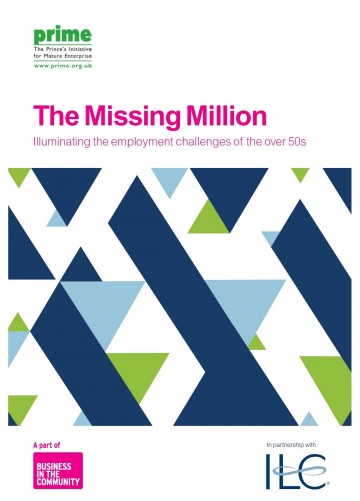Ageing and skills: how and why we are losing out
A powerful new report, The Missing Million, has just been published by PRIME, the Prince’s Initiative for Mature Enterprise. It makes the case for enabling far more older people to stay in work. Many elements of the case are quite familiar: the challenge to us all of an ageing population; the need for individuals to assure themselves of a decent income in old age; the intrinsic value of work, e.g. in the social contacts it brings; and so on. But there is a wealth of factual analysis and insights to back it up, some of them quite surprising (to me at least). Apparently people in the UK on average believe that old age starts at 59 – lower than most countries in the EU, whose average is 62.
The report calculates that £88bn is lost to the economy from the underemployment of older people. I’m getting a bit sceptical of some announcements of this kind, since they usually involve heroic assumptions, in the understandable desire to produce an impressive headline. In this case, the assumption is that the employment rate of older people could be raised to the same as that of younger people, which is probably unrealistic, as they acknowledge. But the basic point is sound and strong: whether it’s £20 billion or £40 or £80, it’s a very big figure.
 The demand is there. ” 26% of people aged 50-64 who are currently out of work, would like to work. These results are suggestive of a silent cohort who are currently out of work but could still make a significant contribution if the right employment support was in place.”
The demand is there. ” 26% of people aged 50-64 who are currently out of work, would like to work. These results are suggestive of a silent cohort who are currently out of work but could still make a significant contribution if the right employment support was in place.”
But there are many barriers: discrimination, lack of training, and so on on the one hand; and caring responsibilities and so on on the other. One of the most important sections concerns flexibility at work. This is crucial, given that older people do work long hours: analysis of the Labour Force Survey shows that those who are in work aged 50-54, work an average of 37.8 hours per week and those aged 55-59 work an average of 36.6 hours per week.
It’s very clear that many more people would stay at work if they could work shorter hours, and ones that suited their timetables more. Partly that’s linked to health: older people do suffer more from aches and pains (don’t I know it…), and serious complaints such as heart or breathing. In fact many people of all ages would rather work fewer hours; the key point is that more older people would be willing to do this and take an accompanying pay cut:
“By age 55-59, nearly 40% of all those in work want to reduce their working hours compared to 7.7% who wish to increase them. In addition, 15% of all those in employment amongst this age group would take shorter hours even if it meant less pay. Overemployment, as it is often termed, is therefore more prevalent amongst this older age group than any other in the UK. It implies that there is a large cohort of people in their 50s who are locked into long hours against their will.”
There is a set of concrete and practical recommendations to finish the report, which provides a good agenda.
On gender, though, I think the report misses a trick. The authors note:
“Until the female employment rate rises to match the male rate, women are likely to remain worse off in retirement than men and reliant on their partner or spouse for income in retirement. The equalisation of State Pension Age is likely to see further falls in female inactivity but women are also more exposed to certain key factors pulling them out of the labour market, such as caring for family members and relatives.”
But the report is a bit short on breakdowns by gender – notably on exactly the issue of the demand for flexible working. Of course they can’t include everything. But there’s an important angle missing: the report ignores the increasing skill levels of succeeding generations of women. This substantially increases (and will go on increasing) the overall cost of failing to enable older workers to carry on – whether or not it reaches the full £80 billion.
